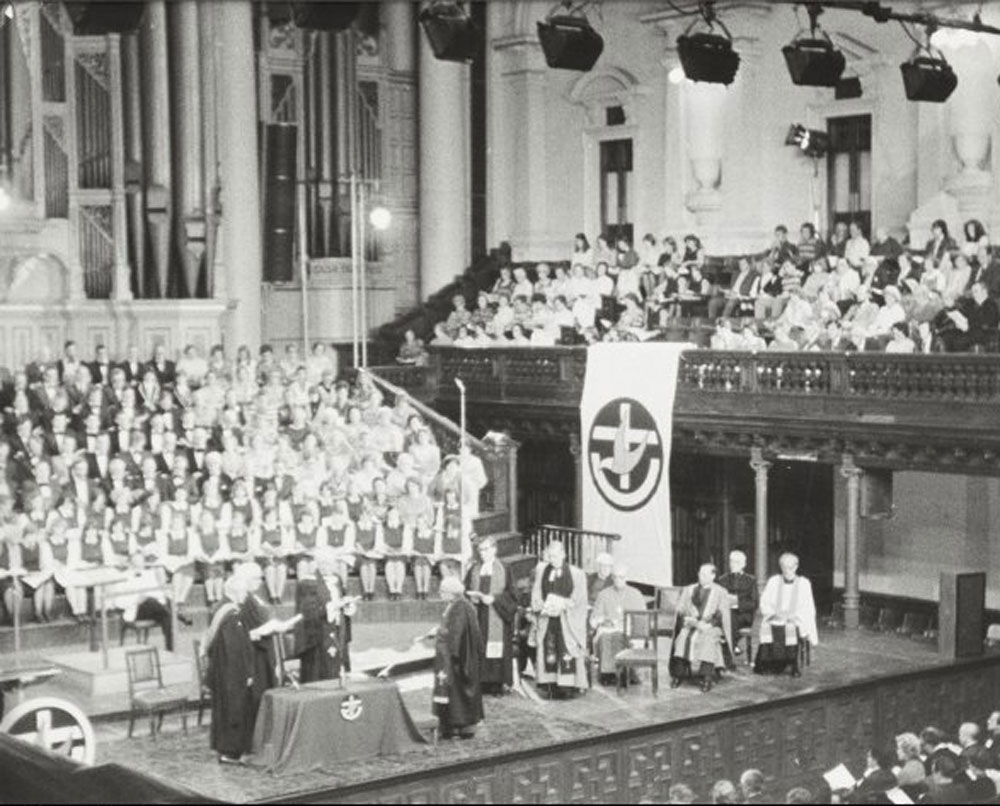The Basis for Continuing

Over the years, the Basis of Union has introduced the Uniting Church to a language of faith that is Christocentric and optimistic, and yet flavoured with humility and grace. And with this new language system, The Basis of Union has also given us a theological grammar that has shaped our liturgy and our preaching, our conversations and our public discourse.

Below are the opening comments from Rev Dr Peter Hobson’s Lecture from 18 November, 2021, titled ‘The Basis for Continuing’. The full video of this lecture can also be viewed below.
Davis McGaughey, one of the original authors of the Basis of Union, a Presbyterian member of the Joint Commission for Church Union, and the first President of the National Assembly of the Uniting Church in Australia, indicated in a lecture that he gave to the Synod of Victoria in 1994, entitled The Formation of The Basis of Union, that the Basis of Union was offered to the newly formed Uniting Church as a basis for its faith – a standing ground for future generations. The Basis was not written simply to bring the churches together – but to guide the church, to inform the church, to shape the church.
According to McGaughey, the Basis of Union was never meant to be some sort of exercise in ecclesial carpentry, whereby the former Presbyterian, Methodist and Congregational churches might better fit together like the legs and seat of a well-made pew, on which we all might sit alongside one another in comfort. Nor was it intended to be an ecclesial anthology, gathering the finest aspects of church life each former denomination had to offer and creating some sort of ‘greatest hits’ album that we could all enjoy listening to – thinking that by doing so we were somehow celebrating the best of who we are. No – the purpose of the Basis of Union was to help the Uniting Church and its members to enter into a deeper commitment to the faith and worship of the Christian Church in all its fullness. The former churches were coming together to discover Christ anew.
Over the years, the Basis of Union has introduced the Uniting Church to a language of faith that is Christocentric and optimistic, and yet flavoured with humility and grace. And with this new language system, The Basis of Union has also given us a theological grammar that has shaped our liturgy and our preaching, our conversations and our public discourse. In 2021, as we celebrate the 50th anniversary of the authorship of this extraordinary document, I wish to honour the enduring legacy of the Basis of Union and its defining qualities that have helped shape the life and witness of the Uniting Church – and also to look to the next 50 years to begin imagining the role of the Basis of Union in influencing the generations to come.
The Basis of Union consists of eighteen separate paragraphs that imagine an authentically Australian ecclesial community, informed by an Evangelical and Reformed tradition heavily reliant upon 20th Century German Protestants such as Karl Barth and Dietrich Bonhoeffer, and the ecumenical optimism of the World Council of Churches following on from the reforms of Vatican 2. The Basis of Union describes a Christocentric, egalitarian and inclusive ecclesiology that distinguishes the Uniting Church from other mainline denominations and church entities.
At least in theory… I have often commented that the Basis of Union is a bit like the American Constitution: a document so revered by its adherents that it takes on a kind of sacred quality and its aspirations then become as unattainable as they are beyond critique.
With all this in mind, my lecture tonight will look at seven characteristics of the Uniting Church as outlined in the Basis of Union. I guess we could say that these characteristics were aspirational when they were originally authored as they were written before union. But they have, I believe, become the defining qualities of our church.
My paper will then go on to list seven commitments that I believe will define the Uniting Church moving forward. In many ways these commitments are also aspirational. Or as President Josiah Bartlett from West Wing fame might say – we have thrown our hat over the wall and now we need to work out how to get it back…
Rev. Dr. Peter Hobson is the Superintendent Minister of Albert Street Uniting Church and also a cooperative Fellow.
